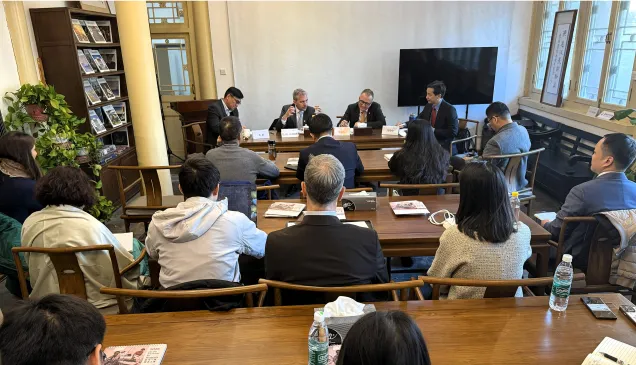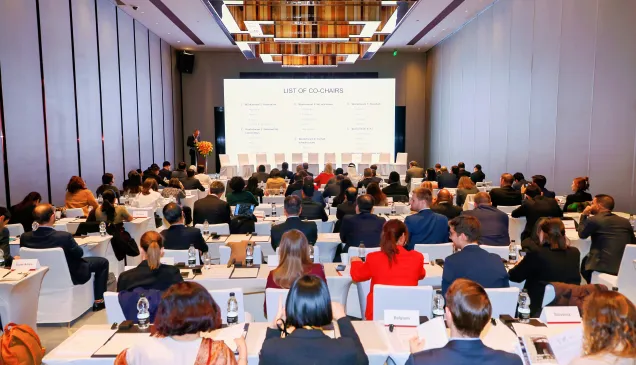Procuring from China: The human side of the supply chain
Procurement and logistics are important for any organization, but especially for a humanitarian organization with operations around the world. For the International Committee of the Red Cross (ICRC), quality and cost are important but so are staff welfare and environmental protection. Our procurement activities – just like the rest of our work worldwide – are underpinned by humanitarian values.
Many of the relief supplies that we distribute to people affected by conflict are manufactured in China. Delegates from our major procurement centres recently visited the country to inspect supplier factories in Beijing, Guangdong, Hebei and Jiangsu.
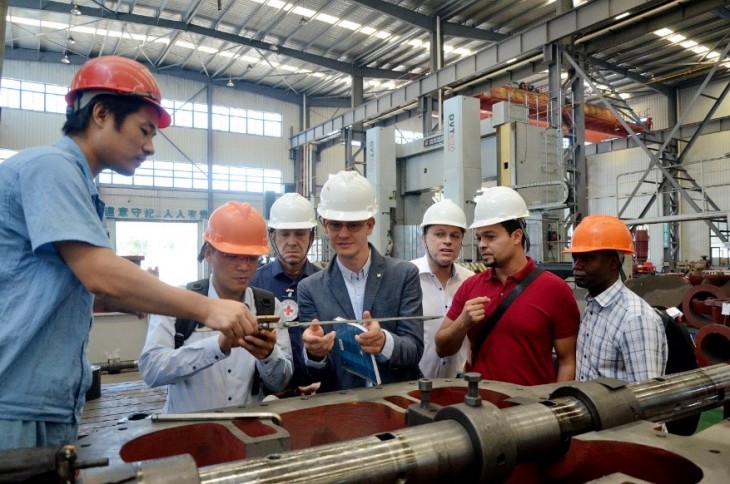 Jiangsu Province, China. ICRC procurement delegates visit a pump manufacturer. ©ICRC
Jiangsu Province, China. ICRC procurement delegates visit a pump manufacturer. ©ICRCThe delegates asked about workers' salaries, safety and overtime. They also spoke to workers to find out about working conditions directly from them. Thomas Riess, 62, a logistician for the Asia and Pacific region, was among the group of delegates. "We keep many humanitarian concerns in mind while making procurements. These include workplace safety, workers' salary and their overtime. We look at the sanitary conditions and washrooms, drinking water provision, emergency exits and the maintenance of equipment," Thomas says. While leading a tour to the workers' canteen at a plastics factory in Foshan, Guangdong province, he proudly adds: "The lunch is subsidized here... it's only two yuan."
"We give the contract to the right supplier," said Bader Rahahleh, a procurement delegate based in Amman, Jordan. "For us, the workers' safety is as important as product quality and suppliers' capacity."
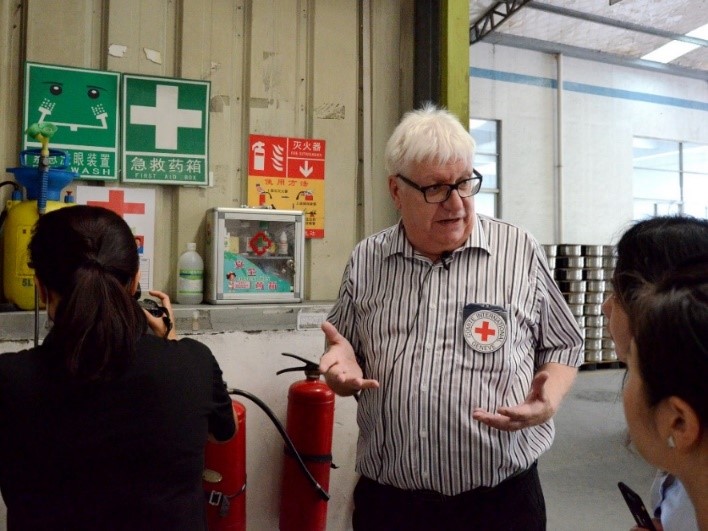 Thomas explains the importance of having first-aid kits at hand. ©ICRC
Thomas explains the importance of having first-aid kits at hand. ©ICRC
The standards are strict and if anything is amiss, questions are asked. "If there's quality control but no rejected products, for example," says Laurent Wismer, our lead buyer for electromechanical engineering and hydraulic, "then we have to question the effectiveness of that quality control."
 Qidong, Jiangsu Province, China. Procurement delegates visit the workshop of a battery manufacturer. ©ICRC
Qidong, Jiangsu Province, China. Procurement delegates visit the workshop of a battery manufacturer. ©ICRC
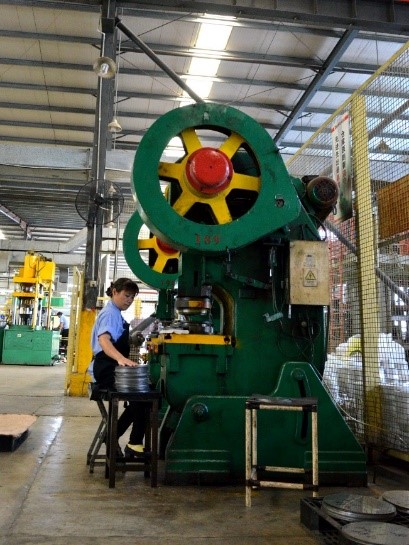 Chaozhou, Guangdong Province. In one factory manufacturing kitchenware, the machines can only be operated using both the hands together, which improves safety. ©ICRC
Chaozhou, Guangdong Province. In one factory manufacturing kitchenware, the machines can only be operated using both the hands together, which improves safety. ©ICRC
In 2011, one of our regional procurement delegates visited a stainless steel kitchenware factory in Guangdong. The factory failed to pass the ICRC's inspection so suggestions for improvement were made.
"We were told our polishing workshop was too crowded," says Cecilia Yang, manager of the export department there. "Workers had piles of products stacked up behind them, which would make it difficult to evacuate the room in an emergency." The delegate also drew attention to the environmental and health hazards caused by the dust from the polishing process and to the pollution in the nearby river. "We were not so aware of the importance of some of these issues before, but have made many changes to improve staff welfare and environmental protection since then."
The company invested more than 3 million yuan to upgrade their polishing workshop over a period of two years. The investment and renovation paid off and the factory is now receiving orders from the ICRC.
 Millions of yuan have been invested to upgrade the polishing workshop and improve the working environment at the kitchenware factory in Guangdong. ©ICRC
Millions of yuan have been invested to upgrade the polishing workshop and improve the working environment at the kitchenware factory in Guangdong. ©ICRC
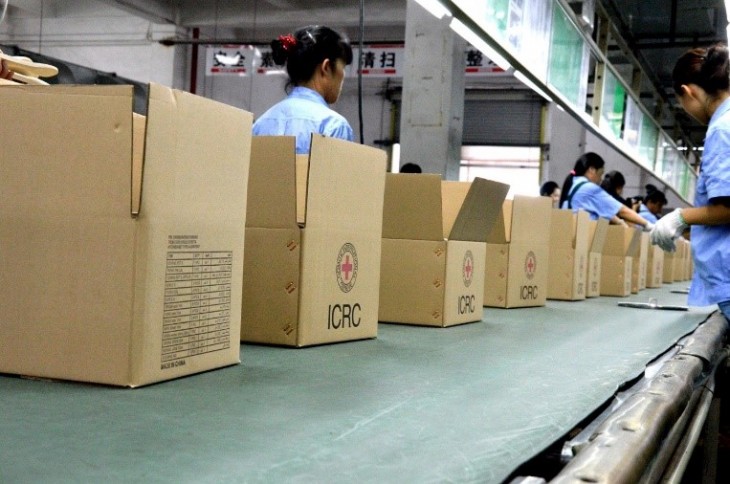 Workers on the assembly line pack boxes of kitchenware ordered by the ICRC. ©ICRC
Workers on the assembly line pack boxes of kitchenware ordered by the ICRC. ©ICRC
The ICRC regularly buys kitchenware, fishing gear, batteries, water pipelines and pumps. However, we also keep an eye out for technological developments that could be beneficial to those we help. The latest product is solar LED lamps, whose rechargeable batteries and a solar panel make them environmentally friendly as well as cost-effective. "Just imagine – three or four years ago, we were still distributing candles," says Thomas! Looking to the future, he adds, "In the next few years, procurement from China is expected to grow by 10% to 20% every year."
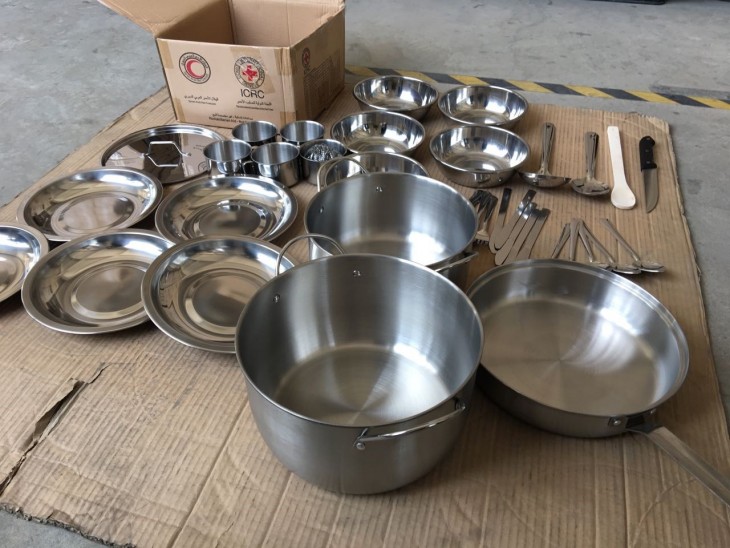 A 38-piece kitchen set manufactured for the ICRC, including pots, bowls, plates, knives, forks and spoons. ©ICRC
A 38-piece kitchen set manufactured for the ICRC, including pots, bowls, plates, knives, forks and spoons. ©ICRC

